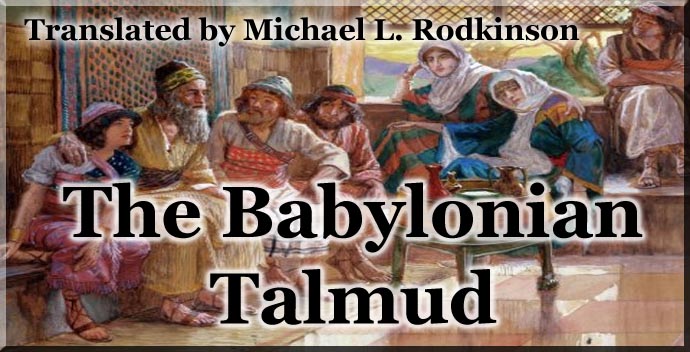|
(SUPPLEMENTARY TO SECOND NOTE)
IT seems to us necessary, in explanation of this curious passage, to make the following extract from our "History of Amulets":
It is no wonder that the change of one letter in a word resulted in the writing of volumes upon volumes and the adoption of hundreds of restrictions.
The following instance will illustrate this: R. Jehudah being once in a company of friends advised the housekeeper not to use for bread-making any other water than that kept in the house, and he expressed it in six words:
אשה לא תלוש אלא במים שלנו
(A woman should not knead with other than our water). The reason was that other water might have been poisoned by snakes, which are abundant in those countries. R. Jehudah said this in reference to the dispute in the Boraitha (Terumath VI.) where one maintained that bread made with water kept in an uncovered vessel outside the house should be burnt, even if it were bread of Terumah. R. Nehemiah was of the opinion that the snake poison loses its power when brought into contact with fire, and therefore that the bread might be used. To avoid this, R. Jehudah advised the use of domestic water, which he expressed by the word (שלנו "our."
R. Mathna, who lived sixty years after R. Jehudah, happened to be in the city of "Papuni" and on a certain occasion (probably
having some objection to the use of the water of that city) lectured in public about using the water which collects in the public streets, and he quoted R. Jehudah's original words: "A woman should not knead with other than our water." The people present understood R. Mathna to have brought some water along with him because of his using the word "our." They therefore came to him the next day with vessels to get some of this water. Then R. Mathna explained in the Talmudic language that he meant domestic water, namely
אנא במיא דביתא קאמרינא
using the word (דביתא) (d'baitha with an א) at the end, having the meaning "domestic." In course of time the word d'baitha was incorrectly copied and the Aleph (א) at the end was changed to Vav (ו), which would make it mean "which has remained over night." The Rabanim, finding the word in this changed form (דכיתו) concluded that it related to the Matzoth (unleavened bread) used at the Passover and therefore maintained that the water used in making Matzoth must remain over night in the house before it is used. Neither R. Jehudah nor R. Mathna mentioned this, but it was assumed simply because these words of R. Jehudah are found in that tract of the Talmud which treats of the Passover feast. The later Rabanim wrote volume after volume upon this subject (see our journal Ha-Kol, Nos. 286, 287, 290, etc.). Still they could not give the least explanation of why they referred this to the Matzoth, and they did not care to investigate where R. Jehudah got it from nor how Matzoth were kneaded before his time.
END OF TRACT PESACHIM.
|



 Home
Home What's New
What's New Bible
Bible Photos
Photos Hiking
Hiking E-Books
E-Books Genealogy
Genealogy Profile
Free Plug-ins You May Need
Profile
Free Plug-ins You May Need
 Get Java
Get Java.png) Get Flash
Get Flash Get 7-Zip
Get 7-Zip Get Acrobat Reader
Get Acrobat Reader Get TheWORD
Get TheWORD